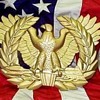Posted 10 years ago
 Chrisnp
Chrisnp
(310 items)
Here are six British Support Arms and Services cap badges I’ve accumulated:
1. The Women’s Army Auxiliary Corps was created in January 1917. When Queen May became Colonel-in-Chief in May 1918, the badge and name were changed to Queen Mary’s Army Auxiliary Corps. I started looking for both badges when I found out I had a great-great aunt that served with the Corps. Unlike most British badges, this one is die cast rather than die struck, and used two flat prongs, one of which remains. The back is marked “PARKER Ltd” and “BIRMINGHAM & LONDON”. Over 57,000 women served overseas in the Corps during WWI. It was disbanded in September 1921.
2. The Royal Engineers has the Cypher of George V in the center, dating it to between 1911 and 1936. During WWI, In addition to other engineer functions, REs also maintained communications, since the Royal Signal Corps wouldn’t be created until after the war.
3. The Labor…um…LaboUr Corps was formed in 1917, from men who were no longer fit for front line service. This badge wasn’t approved until late 1918, and the same badge would be worn by the Pioneer Corps in WWII.
4. The Royal Army Medical Corps had only 9,000 men at the outbreak of WWI, but grew to 113,000 by 1918. This badge could have been worn in either world war.
5. The Army Veterinary Corps continued to have a major impact in a war where horses were still widely used. It treated about 2,500,000 animals by the end of WWI. In recognition of its contribution, it became the Royal Army Veterinary Corps after the war.
6. The Army Service Corps handled supply, transport and other services. In recognition of its distinguished WWI service, it became the Royal Army Service Corps after the war.
















Thanks for the info you provide with your badges Chris.
The numbers of personnel was enormous!
I had never thought of a Veterinary Corp, but it must have been necessary with all of those horses. Do you happen to know if they still have such a thing? (maybe for the dogs?)
I really love the design of the WAAF badge.
Hi racer4four,
Yes there is still a Veterinary Corps, now known as the Royal Veterinary Corps and with a different badge. Of course they are a much smaller force these days. As you mentioned, they do treat military working dogs. They also treat the horses in those ceremonial units that still have them, and work in many of the less developed nations on matters like animal borne diseases. I always liked this badge because the silver monogram really "pops" against the brass wreath and crown.
I only started learning about women in uniform during WWI after learning my great-great aunt had served. Some very kind people helped me learn more about her and her husband Joe at this posting:
http://www.collectorsweekly.com/stories/41327-mounted-rifleman-canadian-expeditionary
Just read that post Chris and the comments.
Amazing history.
Ah, Friday come & gone & no hear from you mon. Maybe we can get a fund raising (tax free & deductible) for you to add to your collection & make happy posts for us. Can't do it where I live (legally!)
This week was a busy one. We've got unusually dry weather for this time of year, and I'm trying to make the best use of it by getting some painting done each day after work before the fall rains start in earnest and I have to bag it till spring.
I have my next post thought out, and I plan to get'er done before the end of the weekend.